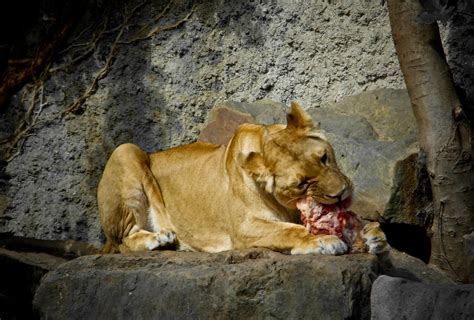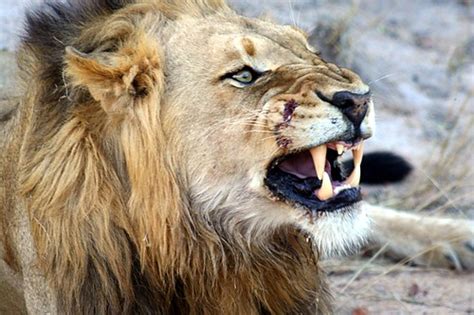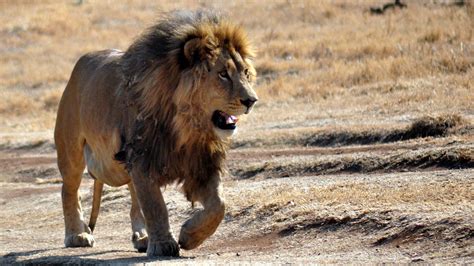Are lions at risk of extinction?
The IUCN Red List classifies Lions (Panthera leo) as “Vulnerable”. This status shows that there are declining numbers and there is a risk to their population as a whole. Worldwide extinction is unlikely, but local extinctions are possible which would further fragment their range. Find out more about the conservation status of lions by visiting the Lion Recovery Fund and consider making a donation.
Do lions attack and eat humans?
Yes lions do attack and occasionally eat humans, although it is relatively rare. Between 1990 and 2010 there were 1000 attacks on humans in Tanzania (approximately 50 per year) (Kushnir et al. 2010). Lions are predators and will attack and consume humans if they get the chance, although humans are uniquely dangerous to lions and so they generally avoid larger villages, towns and cities.
If you want to learn more about how often lion attacks happen, in what conditions and why, check out the scientific papers in the references section at the bottom of the page. We recommend for people to read the abstract and introduction to get a feel for the topic. If you want to know more about what the researchers found, look at the results and see what they learned by browsing the discussion.

Why do lions attack humans?
Lions are apex predators at the top of the food chain and they will consider any other animal, including other lions to be potential prey.
Humans have lived alongside lions in Africa since the emergence of our species during the Pleistocene (Stringer, 2016). During this time there has been interaction between the two species. Lions will know what humans are and also that we are very vulnerable to attack by any large predators. Our main form of defences are our intelligence, use of fire, weapons and travelling in groups.
Are lions afraid of humans?
Lions have a healthy fear of humans, especially during the daylight hours and when we are in groups. This fear is based on our persecution of lions for thousands of years for a few reasons.
One reason why we have attacked and killed lions is because they are a danger to humans and our livestock. Humans would actively find and kill any lions which attacked humans, some people consider this to be important because of the fear of lions developing a taste for human flesh.
Even to this day, lions are regularly killed because they have attacked human’s livestock.

When do lions attack humans?
Lions are most active during the darkest hours of the night when they have an advantage because of their keen senses. Most lion attacks happen during the final hours of the day and when our activities overlap most with the darkness. Between 8-10 pm approximately is therefore the most likely time that you will be attacked by a lion.
A large part of our fear of the dark is theorised to be related to the danger of predators at night. All around the world there are predators which come out at night and terrorised humans for thousands of years. Whether it be lions, tigers or wolves, they have an advantage over us at night and we are best off safe inside our houses when the sun goes down.
Are lions dangerous to humans?
Lions are definitely dangerous to humans because of their superior physical attributes. They are considerably stronger, faster and have sharp claws and strong jaws with large teeth. Humans are relatively defenceless with no particular features that could help us like a shell, or excellent agility.
Though lions are dangerous to individual humans or small groups, lions would be unlikely to approach a large group of humans. We have uniquely big brains for our body size, giving us an edge in intelligence. Over the years we have developed strategies to stay safe from predators, such as secure shelters, using fire and sleeping in shifts to keep at least one person on guard at all times.
Are you planning on going on a safari? Listen to your guide, stay with your vehicle and remember, lions can run faster than you!
If you can’t sleep after reading this article, why not learn more about lions by reading our articles: Can lions swim? and Are lions nocturnal?
Also check out our other article: Do moths sleep? and Do seagulls sleep?
About Discover Tutoring.
We are biologists by training and when we write an article we read the scientific literature to find the most accurate answers to your questions. We do not guess, we do not assume, we check the research. If you are interested in our conclusions and want to find out more, check out the references at the bottom of every page we post on nature.
References –
Kushnir, Hadas & Leitner, Helga & Ikanda, Dennis & Packer, Craig. (2010). Human and Ecological Risk Factors for Unprovoked Lion Attacks on Humans in Southeastern Tanzania. Human Dimensions of Wildlife. 15. 315-331. 10.1080/10871200903510999.
Packer, C., Swanson, A., Ikanda, D., Kushnir, H. (ed. Rands, S). (2011) Fear of Darkness, the Full Moon and The Nocturnal Ecology of African Lions. PLoS One, 6(7): e22285. https://doi.org/10.1371/journal.pone.0022285
Stringer, C. (2016) The origin and evolution of Homo sapiens. Philos Trans R Soc Lond B Biol Sci. 5;371(1698):20150237. doi: 10.1098/rstb.2015.0237.
Western, G., Macdonald, D., Loveridge, A., Dickman, A., Tyrrell, P., & Russell, S. (2021). Understanding the dynamics of lion attacks on humans and livestock in southern Maasailand, Kenya. Oryx, 55(4), 581-588. doi:10.1017/S0030605319000826

